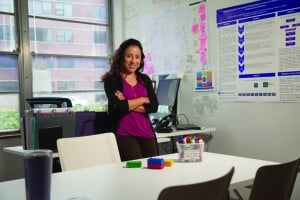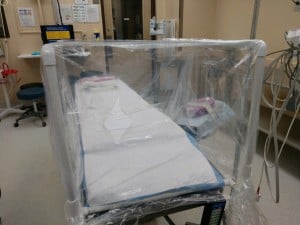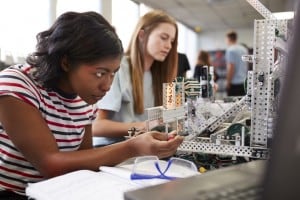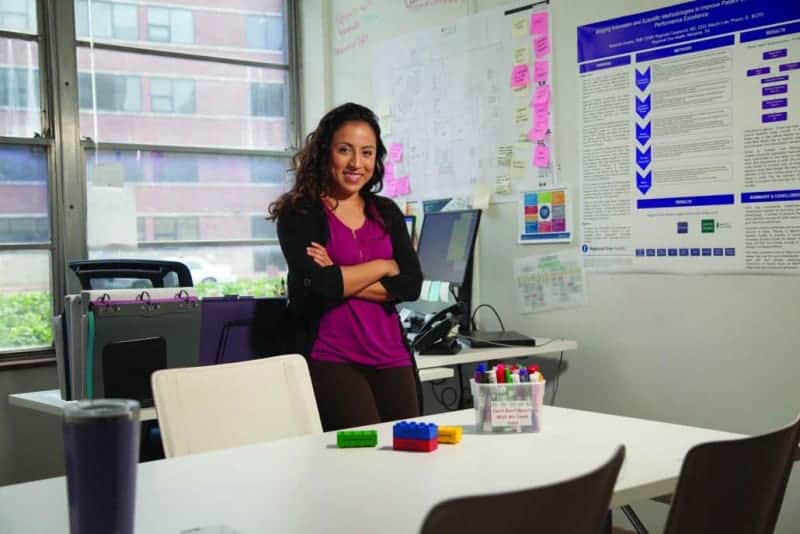The innovation center team recently started a partnership with Christian Brothers University that lets students contribute their engineering knowledge to real-world projects.
It’s a win-win. The students gain valuable experience, and the innovation center benefits from new perspective and the chance to build Memphis’s innovation ecosystem.
Bright young minds, problems in need of a solution, and space to hash out ideas: it’s a winning combination that benefits both Regional One Health and Christian Brothers University.
The two organizations recently embarked on a partnership that will give CBU students a chance to contribute their engineering knowledge to projects at our Center for Innovation. It’s a perfect fit for the innovation center’s mission of bringing disrupting thinking to the health care industry while improving medical services for patients in Memphis and beyond.
Center for Innovation Director Alejandra Alvarez said partnerships like the one with CBU help achieve those goals: “Regional One Health cares for some of the most traumatic and challenging cases and has research orientation and commitment to innovation, and the Center for Innovation is able to bring those two worlds together to fuel disruptive health care innovation,” she said.

Center for Innovation Director Alejandra Alvarez called the partnership a win-win. “We look forward to a fruitful relationship with more projects in the future. The possibilities are as endless as the types of ideas that come through our doors!”
For Michael “Sean” June, PhD, associate professor of mechanical engineering at CBU’s Gadomski School of Engineering, the relationship gives students real-world experience they can carry with them into their careers. Since he teaches many first-generation college students from demographics that aren’t traditionally well-represented in engineering, it’s a way to open doors.
“As a teaching university, our mission is to take these kids and develop them into engineers. We’re not here to screen them, but to develop them,” Dr. June said. “We take a holistic approach so that they leave CBU as productive, experienced engineers.”
The Center for Innovation is supporting that by giving his students the opportunity to apply their engineering expertise to real-world endeavors. Their first project, aimed at protecting health care providers at the height of a pandemic, couldn’t be more timely.
Earlier this year, Alvarez approached Dr. June with that first initiative – an intubation tent that shields providers from respiratory droplets during airway procedures. Regional One Health Certified Registered Nurse Anesthetists Frank Williams and Mary Farris-Conley had created a prototype and were working with the Center for Innovation on testing, refining and scaling.
Alvarez knew her innovation center team had the expertise needed to help them refine their idea through testing and feedback. For years, the center has worked with external and internal innovators on a series of successful projects aimed at improving health care, such as a new device to heal bone fractures and a Manuka honey-based wound care product.

The first project in the partnership between the innovation center and Christian Brothers University is refining a prototype for a shield to protect health care workers during airway procedures.
At the same time, she also knew involving the CBU students would enrich that process while helping her accomplish another key part of her mission. Students could provide engineering perspective on the nuts and bolts of incorporating feedback into an improved prototype, and she would get to promote new engineers who can be part of a bright future for innovation.
“One of our underlying objectives is building the Memphis ecosystem to attract innovators, so this is a perfect fit for our work. Engineering students are essentially the inventors of the future,” Alvarez said.
To kick off the partnership, Alvarez and Dr. June tasked students with finding ways to make the intubation tent portable, easy to use and easy to store. Students reviewed existing products, including the one created by the Regional One Health providers, then worked on their concepts.
“There are different ways to innovate, and I don’t necessarily tell the students which approach to use,” Dr. June said. “Our partnership with Regional One Health exposes them to really good, creative ideas, and it gives them a chance to collect and channel those ideas.”
Students start with a brainstorming process that Dr. June bases on his time as a master inventor at IBM, where he obtained 25 patents. “IBM’s ecosystem and support structure ensures you can be innovative. I’m bringing that ecosystem and methodology to CBU,” he said. “Our environment is intellectually safe, and that gives me an opportunity to teach this innovation mindset.”

Engineering students at Christian Brothers University are getting an opportunity work on real-world projects thanks to the Center for Innovation. It helps them learn valuable hands-on skills and prepares them for their careers.
Dr. June’s process, coupled with the framework and methodology at the Center for Innovation, lets students play a meaningful role in real-world projects and in supporting Memphis’s growth as an innovation hub. In doing so, they learn about all aspects of the engineering process.
“My generation built model airplanes and took apart stereos. This generation has wound up not doing those things as much,” Dr. June laughed. “We see a lot of students in engineering programs without the skills you need to do simple prototyping, such as soldering, measuring and cutting. Those skills are important, and allow us teach them through project-based learning.”
“It’s very valuable for the students,” he added. “We’re building a long-term relationship that gives students a chance to work on real-world problems. Regional One Health and the Center for Innovation are an important partner, and we look forward to being in it for the long haul.”
Alvarez agrees. “We’re always looking for high-performing partnerships that help us move ideas forward,” she said. “We look forward to a fruitful relationship with more projects in the future. The possibilities are as endless as the types of ideas that come through our doors!”

